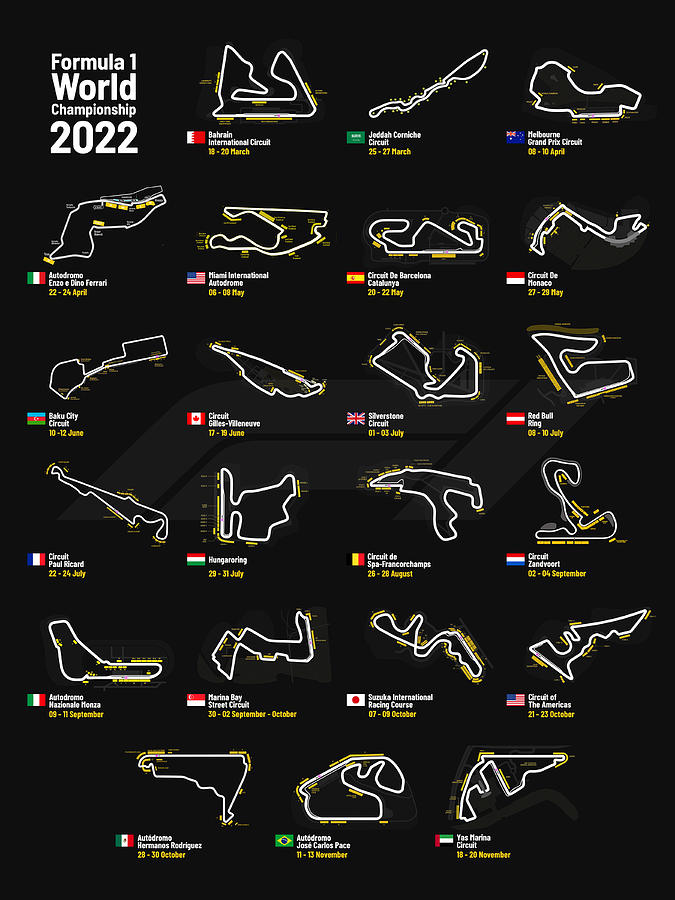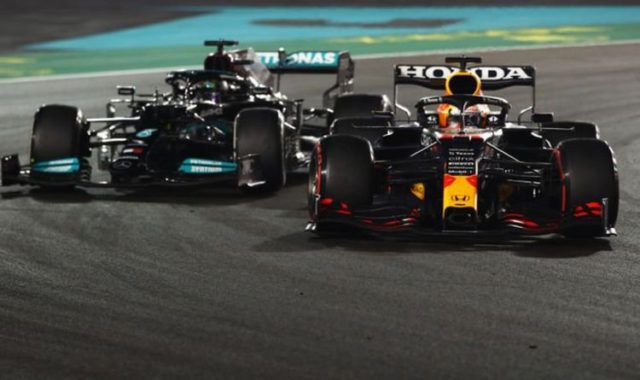There are too many things to watch on TV these days. So, at the risk of undermining the entire purpose of this article about why you should watch a particular sport: it’s okay if you don’t watch a particular sport.
Ratings are down for Major League Baseball? Fine. You missed the last Champions League Final? No worries. That’s just the way the media landscape is these days. There are a billion games to watch and a zillion TV shows and everyone’s like “hey did you catch True Crime: The True Story About Crime?” No, because I was watching a different show on a different streaming service that was also about the same murder, probably!
Yet here I am, attempting to persuade you, American Sports Fan, to watch Formula 1 auto racing, starting this weekend.
The thing about F1 is that it combines a lot of the great attributes of more popular American spectator sports. It’s easy to follow, exciting to watch, and it’s fun to take in a race. But you just don’t know much about it, yet. Or maybe you’ll hate it, but–and I’m sorry to sound like a drug dealer–you should try it, man. Just once. Because it might end up being one of your favorite things to watch. That’s what happened to me.
I’ll spare the whole story, but you should know that I couldn’t give two tyres about auto racing most of my life. And then in January 2021, I watched a documentary on Ayrton Senna, one of the all-time greats from the 80s and 90s, and I was hooked. Immediately. You mean to tell me that tens of millions of fans across the world were watching this international sport that I knew nothing about? I felt like there was a parallel universe of sports that I missed, because I was an American. I focused on the sports that were on American TV. But now, I wanted to learn everything about the sport (and if I were you, I would watch Senna. It’s fantastic and it has one of my favorite movie soundtracks).
If you’re American and you’re really into sports, you are probably similar to me. You probably grew up loving some combination of football, baseball, basketball, and maybe hockey and soccer. And you know why? It’s not because those would be your favorite sports to watch in a vacuum. It’s because that’s what has generally been accessible on TV, and that’s what American highlight shows and water cooler conversations usually focus on. Don’t discount how much of our media diets is based on what’s pushed to us. ESPN is pretty powerful. Sure, every four years we’ll focus on the World Cup, or the Olympics, but it’s generally a steady stream of football, basketball, football, baseball, football, and football.
I’ve spent the last 12 months telling anyone who would listen: Formula 1 is great sports spectacle. And to explain why I love it, I often talk about analogies to other sports. So that’s what I’ll do here, giving you 10 ways in which Formula 1 is like (or not like) the best aspects of your favorite American sports.

Three reasons why it’s easy to watch F1:
1. Like watching random Olympic sports: the Sky Sports/ESPN commentators make it easy for the casual fans.
I didn’t know much about the sport when I watched my first race live in March 2021. But the commentators make it really easy to follow. I personally think David Croft and Martin Brundle do a good job for casual fans: they’ll explain many of the rules and why people choose certain strategies. Though I’ll bet serious F1 fans think they baby the audience a little bit. That’s okay with me.
2. Like rooting for an NFL team: The commitment level is low, and the payoff is high.
If you’re willing to give it a shot, this is my number 1 selling point for F1. Your favorite baseball team plays 22 hours per week. Your favorite basketball team plays 8 hours a week. Formula 1, however, is more like NFL team fandom, in which you have to watch 3 hours a week for 17 weeks. But actually, F1 is easier than that.
If I want to watch all of an F1 team’s or driver’s races, I would tune in for Qualifying on Saturday (90 minutes, and you can fast forward through parts) and the race on Sunday (around 110 minutes). That’s a little more than three hours each week to watch my team. Sure I could watch practices on Friday…but I could also go the other way and only watch the race on Sunday, so we’re talking less than two hours every other week. That’s such a small commitment.
3. Better than rooting for an NFL team: The commitment level is actually really low, because you are watching all the teams at once.
What I just mentioned about having to tune in for about three hours each week…that’s not just for one team, that’s to watch ALL the competitors. All the drivers, all the teams, at the same time. Imagine watching one football game every week and you are seeing Pat Mahomes, Tom Brady, Aaron Rodgers, Joe Burrow, and 17 other quarterbacks, and they’re all competing against each other. That’s F1. When you watch the Bahrain Grand Prix, you’re seeing all 20 teams with the quarterbacks/drivers. You don’t need to choose which game to watch, and you don’t have to catch highlights of a different game later.
Do you understand how nice that is? To follow all F1 teams and drivers, I only have to commit 2-3 hours every other week, and I’m pretty much seeing it all. Think about that. What other top-level sport can give you that return on your commitment?
Four reasons why its exciting to watch F1:
4. Like the NBA, NFL, or your favorite soccer league, each athlete/driver/team has their own personality and style.
Steph Curry and Giannis Antetokounmpo have completely different skill sets on the basketball court. Love or hate Bayern Munich, they are one of the most fun teams to watch because of their style. Pat Mahomes plays QB in a way we haven’t seen before. The stylistic differences are what makes sports so much fun to watch.
It’s the same with F1 drivers (and teams). They’re all different and you’ll end up seeing their strengths and weaknesses at play during each race.
If you want comparisons for the some of the top drivers:
Lewis Hamilton (Mercedes) is like Lebron James if he had great teammates and beat the Warriors four times in a row. He’s one of the two most accomplished athletes in his sport, all time. Great social impact off the court/circuit, pretty whiny about things, and still playing at an extremely high level into his late 30s.
Max Verstappen (Red Bull) is like Giannis if he played recklessly. Supremely talented, just won his first title, likely with more to come. But he’s known for pushing the limits of what’s considered appropriate driving, and only caring about winning, like a young Russell Westbrook.
Carlos Sainz and Charles LeClerc (Ferrari) are like Jason Tatum and Jalen Brown. The best young duo in the NBA, with different styles, playing for one of the most storied teams in history that is trying to return to glory. Though LeClerc is a more exciting driver than that, maybe something like Devin Booker.
George Russell (Mercedes) is like Luka Doncic. Everyone knows that with the right people around him, he could win title after title. And he’ll have his chance this year with the best team.
Daniel Ricciardo (McLaren) is a very happy Charles Barkley. Not a contemporary athlete but stick with me. A excellent talent who played for a couple different teams, hasn’t won it all (yet), and is quite entertaining off the court/circuit.
Lando Norris (McLaren) is actually kinda like Jimmy Butler. Watch him play and you don’t see anything eye-popping, but he’s smart and analytical and that’s why he gets great results. Also, please watch this video of Lando Norris and Jimmy Butler.
5. Like watching any sport: you can make it simple, or you can get into the strategy.
Whoever scores more points in a basketball game wins. So you root for players to put the ball in the basket. When you watch a pitcher throw to a batter, you can say “hit the ball!” and that would still be fun. If you want to approach F1 the same way, you can root for drivers to go faster and finish first.
But you can go as deep as you want to go. There’s all sorts of stuff about aerodynamics, performance, reliability, race strategy (including pitting), tyre degradation, endurance, team play, and more. You can really get into all these details if you want to. Or not!
Learning the basics of race strategy is what flipped a switch for me. I always thought racing was “go faster and don’t let them pass.” I didn’t realize how much went into how you decide to race, when to pit, when to race harder, etc. But like art and wine, it all sounds a bit pretentious until you actually start to understand more about it.
6. Like a combo of golf, tennis, and your favorite team sport: you can root for players/drivers, and you can root for teams.
This is one of the cool parts of F1 that is not really similar to major American sports. I might be a Warriors fan and a Giannis fan, though if they are going to play against each other, I kind of have to choose one.
In F1, You can root for teams and you can root for drivers, and there are two drivers for each team. And teams and drivers can both have success in a race. Let’s say I’m an Anglophile: I could root for the British drivers (Hamilton, Russell, and Norris) and also root for McLaren (Norris and Ricciardo), the British team. And they could both earn points in the same race. Because…
7. Like watching European soccer: there are lots of prizes.
All drivers are trying to win the World Drivers’ Championship (most points over the course of the season). All teams are trying to win the World Constructors’ Championship (same, but for teams).
But on top of that, winning a single Grand Prix (basically, a race) is a really big deal, too, especially for drivers who don’t win all the time. And even if you don’t win, you still want to finish well because there are points distributed to the top 10 finishers, and that will affect the WDC and the WCC.
Lastly, teams will talk openly about where they want to finish. Some teams in the midfield (not the top teams) will say “we want to finish 3rd,” which is not something you hear much in American sports. So in each race, it’s not just about who wins; these teams really care about 4th vs 5th and 8th vs 9th in a race.
Three (more) reasons why it’s fun to watch F1:
8. Unlike American sports: you can take a little international vacation with each race.
I read an article that said something like: F1 always feels like it’s coming to you from the French Riviera, even when it’s not. And it’s true. It always feels a bit European (because it is) and carefree (because I don’t have to do anything). Also, half the drivers live in Monaco anyway, and most of the drivers and teams are originally from Europe. So it’s got that flair, no matter where the race is happening.
There are races in Monaco, the South of France, and Barcelona, but also Japan, Mexico, Spain, Australia, and other places across the world. And each race day feels a little bit like a vacation to one of those spots. My personal favorites to think about? Monaco, Italy, Hungary, Austin (USA), and Mexico City.

9. The theme song, opening package, and start of the race are all fantastic.
I love the theme song. It’s perfect for this sport. And when it’s over, and you see the aerial shot of whatever location, and David Croft says “Welcome to the streets of Monaco…” Feels good.
But then! This is the only sport where the excitement of the start of the event equals the excitement of the end. When Croft says “it’s lights out and away we go!” (good video) you get to watch 20 cars jockeying for position in one of the most exciting (maybe the most exciting) parts of the race.
10. Like baseball: each circuit is unique.
Something I’ve always loved about baseball stadiums and fields is they’re all different. The Green Monster, the ivy at Wrigley, the foul territory at the Coliseum…these aspects all change how the game is played.
It’s like this with F1 but more so. Every circuit is unique. Some are designed for racing (Austin), some are street circuits (Miami). Some (Suzuka/Japan) have more turns, some have different surfaces right off the track (Zandvoort/The Netherlands). Some (Monza) are way faster than others (Monaco). The uniqueness of each track adds to the fun of each race.

The last thing I’ll say is that I enjoy watching a sport for which I don’t really have a strong rooting interest. I slightly root for Ferrari and their drivers (Sainz and LeClerc), as well as Sebastian Vettel and Daniel Ricciardo. But in the end, I really don’t care too much, as I’m watching more for the spectacle, and all the reasons listed above. And I think it’s nice to have sports to watch where you can enjoy them for the sport itself. Maybe that will be F1 for you, too.
So if you’re interested in watching, you can search your internet provider for Formula 1, and make sure to record the season. And if you want to get really in depth, I recommend watching videos by Chain Bear on YouTube. Or you can ask me any questions on Twitter and I’ll do my best to point you in the right direction.
